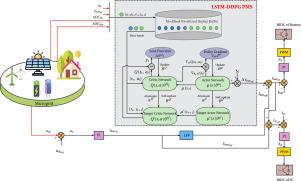An LSTM-DDPG framework power management strategy for a heterogeneous energy storage system in a standalone DC microgrid
IF 8.9
2区 工程技术
Q1 ENERGY & FUELS
引用次数: 0
Abstract
A heterogeneous energy storage system (HESS) is implemented to combat the DC bus voltage instability and power allocation problem caused by high penetration of renewable energy sources (RESs) in a standalone DC microgrid. The HESS comprises a battery and supercapacitor aims to smooth DC bus voltage. Thus, a potent ongoing trend is the development of intelligent power management strategies (PMS) that boost the efficacy of RESs-based DC microgrids using deep reinforcement learning (DRL) techniques. In particular, long short-term memory (LSTM) is incorporated into a deep deterministic policy gradient (DDPG) framework to tackle real-world microgrid power management problems. This method uses DDPG for power allocation decisions, while LSTM is applied to extract environmental state variables from observations. Implementing an LSTM-DDPG PMS quantifies transient performance and minimises voltage deviations from the rated DC bus voltage while maintaining battery and supercapacitor state of charge (SOC) within defined limits to prevent overcharging and excessive discharging cycles. Furthermore, the HESS’s power flow is dynamically regulated by optimal current controllers, which facilitates efficient PMS and enhances overall system stability by precisely tracing respective currents. The effectiveness of the proposed PMS is assessed under different solar, wind, and load power situations. The simulation results demonstrate a substantial decrease in highest disparities of the DC bus voltage compared to traditional PMS approaches. The suggested technique is confirmed effective by real-time validation of the simulation outcomes with the OPAL-RT real-time simulator.

独立直流微电网中异构储能系统的 LSTM-DDPG 框架电源管理策略
为解决独立直流微电网中可再生能源(RES)的高渗透率造成的直流母线电压不稳定和功率分配问题,采用了一种异构储能系统(HESS)。HESS 由电池和超级电容器组成,旨在平滑直流母线电压。因此,目前一个有力的趋势是开发智能电力管理策略(PMS),利用深度强化学习(DRL)技术提高基于可再生能源的直流微电网的效率。其中,长短期记忆(LSTM)被纳入深度确定性策略梯度(DDPG)框架,以解决现实世界中的微电网电力管理问题。该方法使用 DDPG 进行电力分配决策,同时应用 LSTM 从观测结果中提取环境状态变量。实施 LSTM-DDPG PMS 可以量化瞬态性能,最大限度地减少电压与额定直流母线电压的偏差,同时将电池和超级电容器的充电状态 (SOC) 保持在规定的范围内,防止过度充电和过度放电。此外,HESS 的功率流由最佳电流控制器进行动态调节,这有助于实现高效的 PMS,并通过精确跟踪各自的电流来增强整个系统的稳定性。在不同的太阳能、风能和负载功率情况下,对所提出的 PMS 的有效性进行了评估。仿真结果表明,与传统的 PMS 方法相比,直流母线电压的最高差异大幅减少。通过使用 OPAL-RT 实时模拟器对模拟结果进行实时验证,证实了所建议技术的有效性。
本文章由计算机程序翻译,如有差异,请以英文原文为准。
求助全文
约1分钟内获得全文
求助全文
来源期刊

Journal of energy storage
Energy-Renewable Energy, Sustainability and the Environment
CiteScore
11.80
自引率
24.50%
发文量
2262
审稿时长
69 days
期刊介绍:
Journal of energy storage focusses on all aspects of energy storage, in particular systems integration, electric grid integration, modelling and analysis, novel energy storage technologies, sizing and management strategies, business models for operation of storage systems and energy storage developments worldwide.
 求助内容:
求助内容: 应助结果提醒方式:
应助结果提醒方式:


